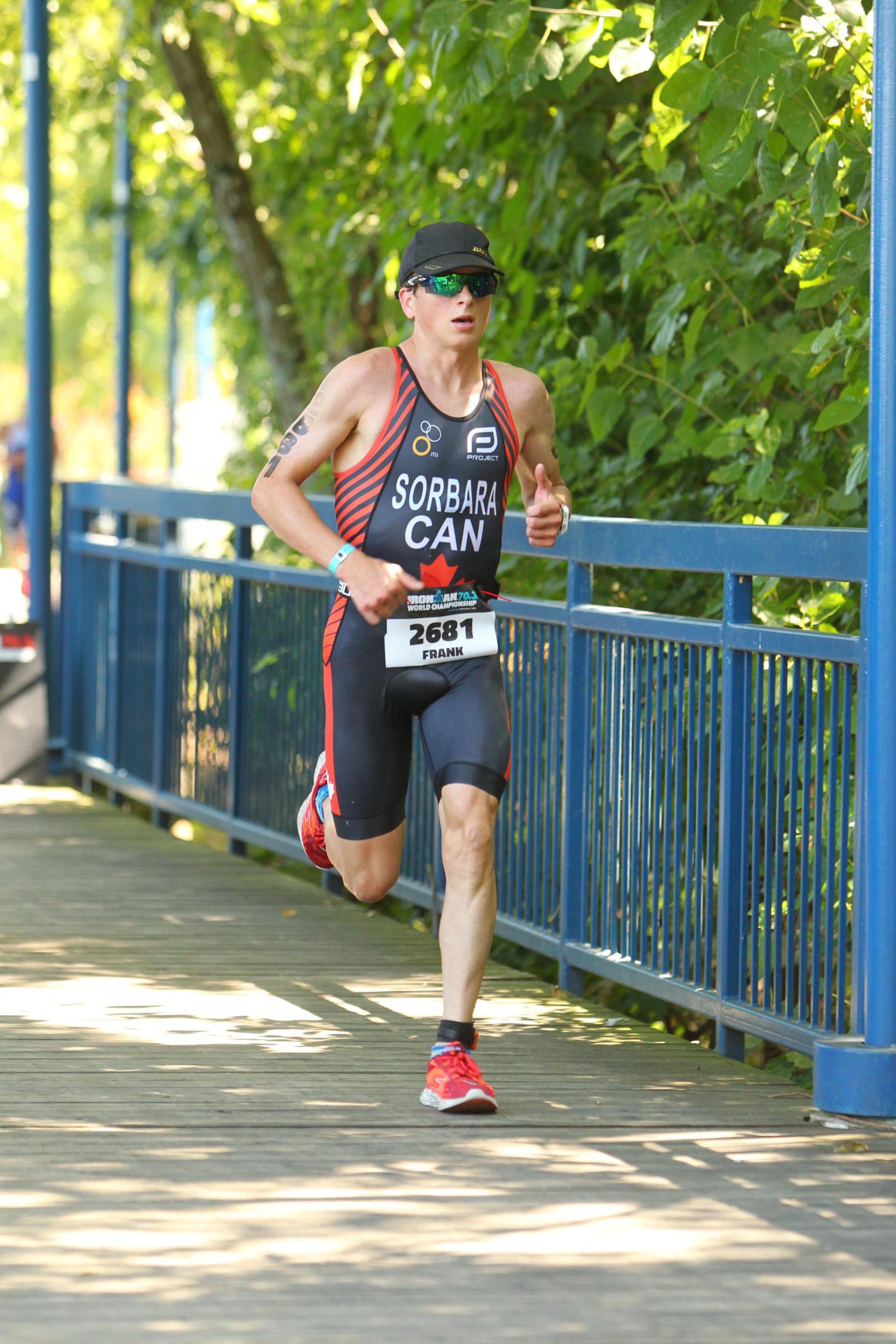— By Helen Powers
Frank Sorbara wanted so badly to succeed in the ITU Long Distance World Championships last August that he postponed his physiotherapy certification to focus on training. Along the way, things went badly and doubts set in. So when he did sand on the podium as winner of his age group and top overall age grouper, it was a very sweet victory.
“In June and July I thought Penticton was a no-go,” says 25-year-old Sorbara. He even considered calling Triathlon Canada to see if he could switch to a swim/bike event. “I just didn’t think running was in the cards.”
Sorbara ran track and cross-country during elementary and high school. Looking for a new challenge, he tried his first marathon at age 18 where he qualified for the Boston Marathon. For four years he ran 5 and 10 km races, along with half- and full marathons. His best year was 2013 when, amongst other breakthrough races, he finished sixth at the Scotiabank Toronto Waterfront Marathon.
The next year he dealt with a number of stress fractures, possibly from running too many marathons. Wanting to keep fit, but looking for relief from the injuries, Sorbara moved to triathlon because of the lower impact of biking and swimming.
The idea was sparked while he was at McMaster University, from 2014 to 2016, for a master’s degree in physiotherapy. Some of Sorbara’s teammates on the cross-country team were experienced triathletes.
“We had pool swims for cross-training,” he recalls with a laugh. “I was swimming with them, but not really swimming ‘with them.’”
In June 2016, Sheryl Ross became his swim coach and Sorbara says it made a big difference.
“Frank was a strong athlete who could hold a fast swim pace, however, he was not a competitive swimmer,” Ross recalls. “He had very little swim background or knowledge, but there was great potential to improve with training and coaching that was focused and specific.”
Sorbara’s first triathlon was in 2015. His first long distance triathlon was in November 2016, in Miami, where he placed sixth overall and first in his age group despite the heat and humidity.

“It was a bit of a shocker for the change in weather,” says Sorbara. “The swim and bike were OK, but the running was tough.”
He could have written his final physiotherapy exam that month, or the following June, but he postponed it to concentrate on the ITU competition coming up in August.
“It was a bit nerve-racking at the time to go fully into it,” he says. His parents have been very supportive and he reassured them: “Don’t worry, I will do the exam eventually, but let me do this first.”
Ross says Sorbara is an extremely dedicated athlete.
“Frank has so much mental strength and that is a key trait for success in this sport,” she says. “Sometimes I have to remind him to slow down and let the body recover.”
By spring, an old injury was giving him trouble. It had been diagnosed as a hip flexor tear, but in June an MRI revealed a full thickness hip labral tear and lots of damage to the bone and lining.
“It was a mess in there,” says Sorbara, who thought his season might be over. A surgeon recommended he start physiotherapy and continue running. This worked and Sorbara was finally pain-free.
Two weeks later, he was hit by a car during a cycling workout. He had a minor break in his hand, but his bike was totalled. There was just one month left until Penticton. Sorbara rides an unusual frame size – 48 cm – but he was fortunate to be able to borrow a similar bike while waiting for his replacement.
On the day itself, Sorbara’s highlight was passing another triathlete in a strange déjà vu.
“I caught up to him at almost exactly the same point at Ironman 70.3 Miami last November,” he explains. “Back then, within the next kilometre he dropped me hard, and from there on the final 10 km was a death march.”
But not this time.
As Sorbara stood on the podium, he couldn’t believe everything came through on race day. “It wasn’t like the bike or the swim was phenomenal,” he says. “It was the run that came through and that was what gave me trouble the whole year. It was a really great feeling.”
His Penticton win met the final criteria to become a professional athlete, a long-time dream of Sorbara’s. He looks forward to combining physiotherapy work with triathlon competitions and coaching. And now he has time to write that exam.
Helen Powers is a freelance journalist from Dundas, Ont.
